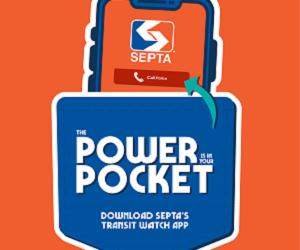
SEPTA's Micromobility Playbook Introduced
September 21, 2023

This week - SEPTA released its Micromobility Playbook under the SEPTA Forward Strategic Plan.
The playbook is an update to the agency’s Cycle-Transit Plan of 2015 created with actions to make using micromobility with transit seamless and convenient for people in our region.
The plan includes recommendations for improving systemwide access to transit stops, expanding station amenities, vehicle accommodations and connections to the transportation network and providing a framework to increase ridership by better accommodating riders that use micromobility. Micromobility devices are here to stay and SEPTA - along with our partners - are proactively changing policies, operations, infrastructure, and passenger communication.
Micromobility is any small, low-speed, human/electric-powered transportation device: bicycles, scooters, electric-assist bicycles, electric scooters, (e-scooters), and other small, lightweight, wheeled conveyances.
Micromobility makes transit more functional by expanding its reach to more people. Those who cannot get to a transit route because it’s not within walking distance can use micromobility to get there. A 10-minute walk reaches 1/2 mile from a transit stop; a 10-minute bike ride reaches 2 miles. People who do not have a nearby transit route can use micromobility to get to a route that’s farther away. Even people who are on a transit route can use micromobility to reach a more frequent bus route or a rail station.

Micromobility has become an essential part of the SEPTA system. Being able to incorporate this into our transit system creates a seamless and integrated transit network, improves access to transit, emphasizes sustainability and provides accessibility for all.
“By prioritizing the needs of micromobility users - we are creating a lifestyle network that is inclusive, convenient, and sustainable,” said SEPTA General Manager/CEO Leslie S. Richards. “This Playbook is a testament to our dedication to providing exceptional service to our riders and we are proud to be a bicycle and micromobility-friendly transit system that encourages all riders to use their device in connection with our services.”
Key elements of the Micromobility Playbook include:
- Communicating a uniform policy with operators and customers
- Retrofitting existing vehicles for micromobility and other wheeled equipment
- Improving the experience for parents, caregivers, and ADA community with station entrance/exit design and open stroller access on vehicles
- Installing bike or scooter parking at all Regional Rail and Metro stations - including smart parking solutions
- Enhancing the connection between transit and Indego bikeshare through improved wayfinding and placement on SEPTA property
- Supporting Complete Streets and the construction of trails connecting SEPTA properties, stations, and services
“This Playbook is a positive step to improving first mile/last mile transit access,” said Michael Carroll, Deputy Managing Director for Philadelphia’s Office of Transportation and Infrastructure Systems (oTIS) and SEPTA board member. “Access to transit via micromobility supports an equitable transportation network by offering many benefits, including financial, environmental, health, and improved mobility throughout the region.”
The Micromobility Playbook is also being released in conjunction with ‘Zero Emissions Day’ (September 21) and ‘Car Free Day’ (September 22). During these days motorists are encouraged to give up their vehicles for a day and use public transportation or any form of micromobility. Telework is also encouraged for those who have that ability.
Thank you to all our riders for helping reduce the city’s greenhouse gas emissions and traffic congestion by riding SEPTA. To celebrate - we will surprise customers at various bus stops in and around Center City Philadelphia on Friday, September 22 with $5 Dunkin’ gift cards and SEPTA swag!
Current SEPTA micromobility guidelines (vehicle operators and train crews are responsible for assessing conditions and implementing these guidelines based on their best judgment):
- Fully collapsed micromobility and folding bicycles are permitted on all vehicles as luggage
- Doorways and aisles should be kept clear of micromobility
- Electric micromobility (e-bikes, e-scooters, personal e-devices) must be turned off before boarding and are not permitted to charge on SEPTA vehicles or property
- In case of emergency evacuation, all micromobility must remain on the vehicle. For this reason, we encourage you to have owner identification information attached
For more information on the Micromobility Playbook and other sustainability initiatives - click here.
Read the Micromobility Playbook here.



